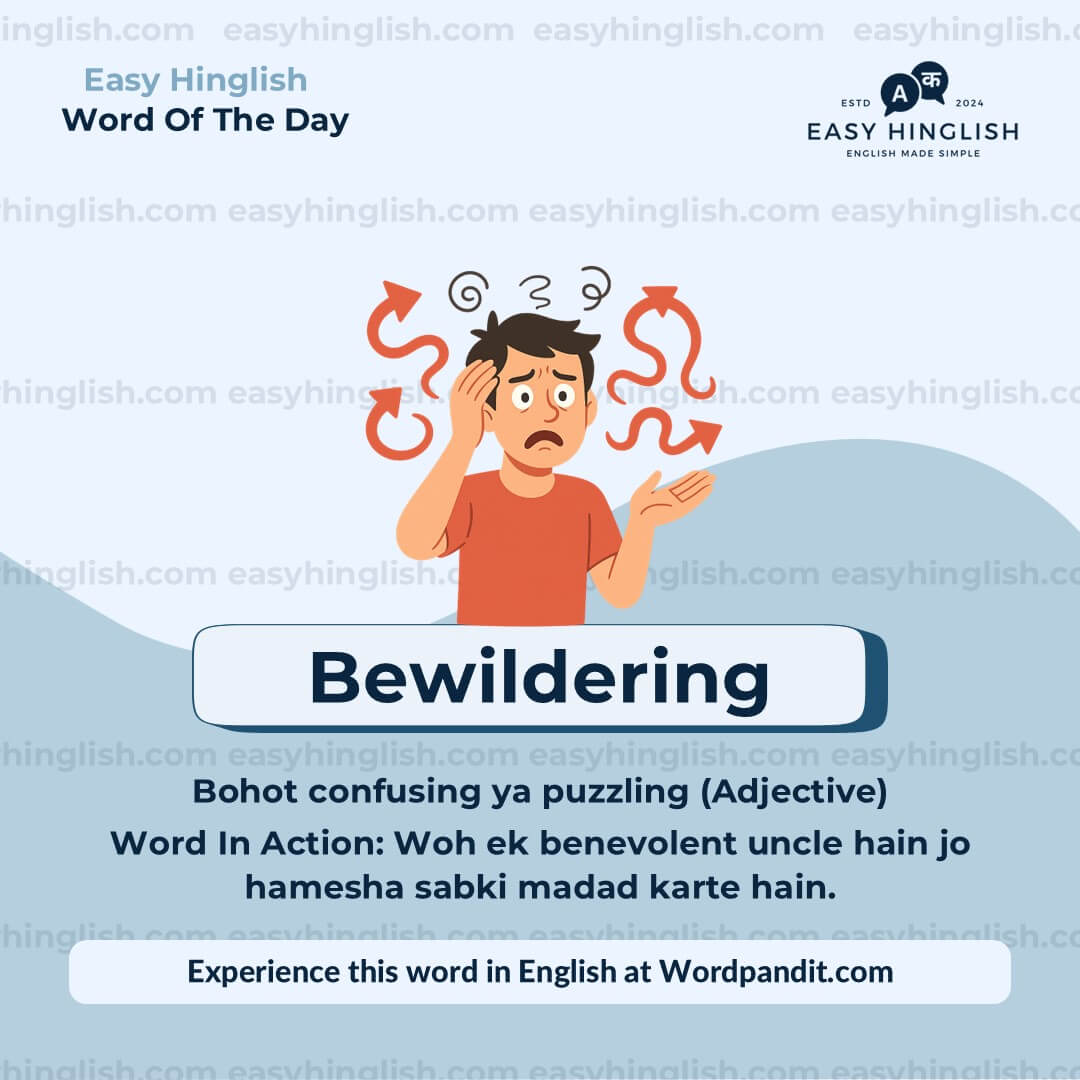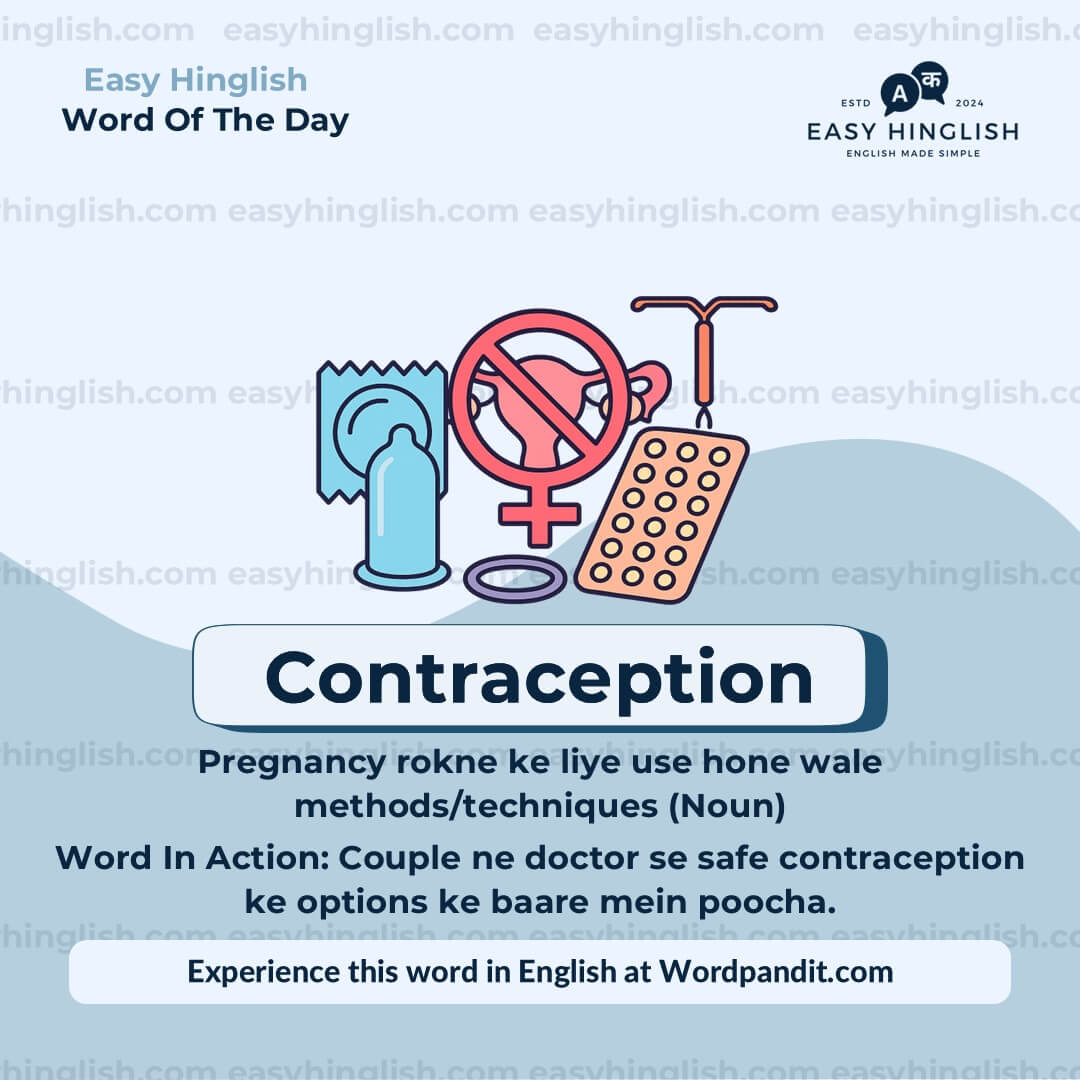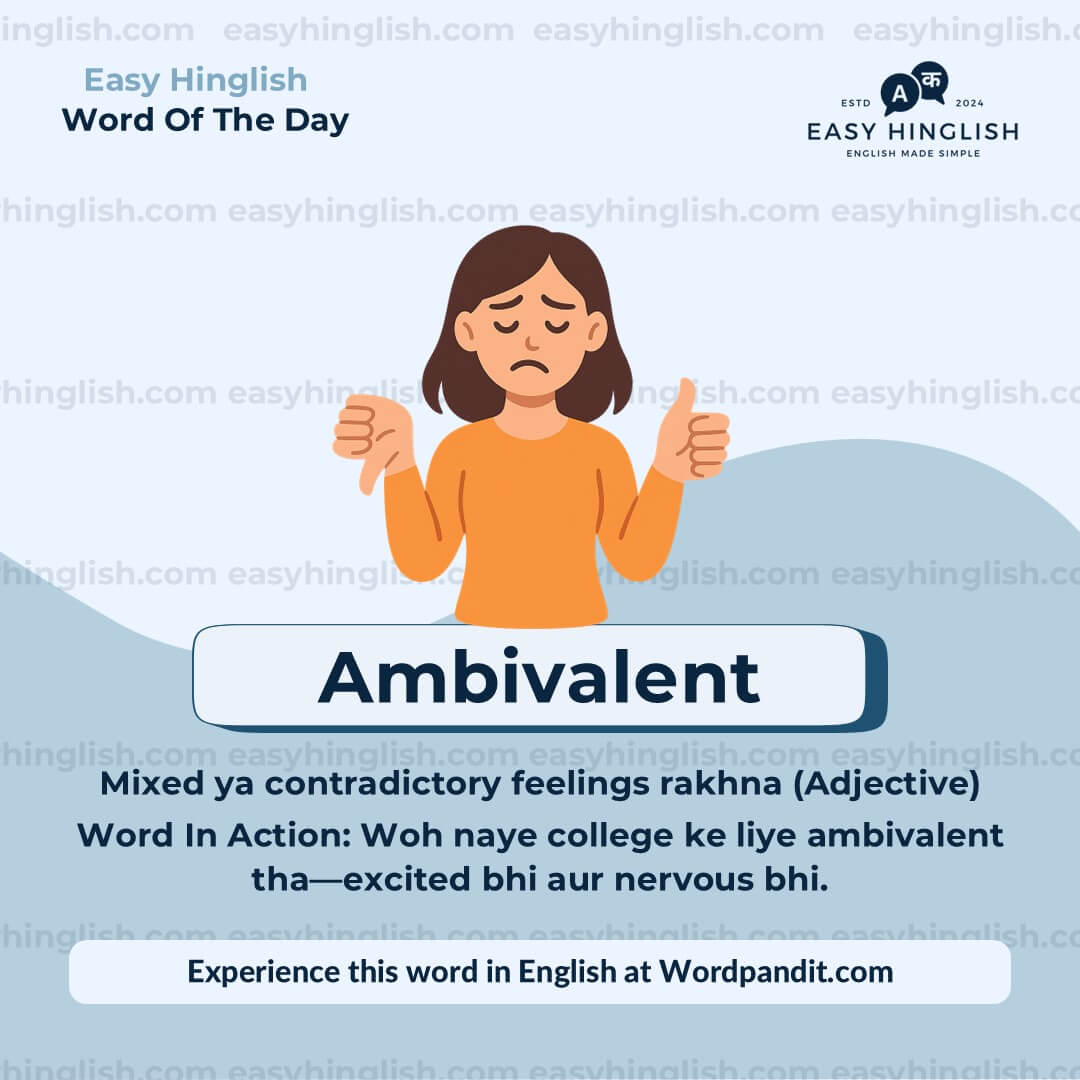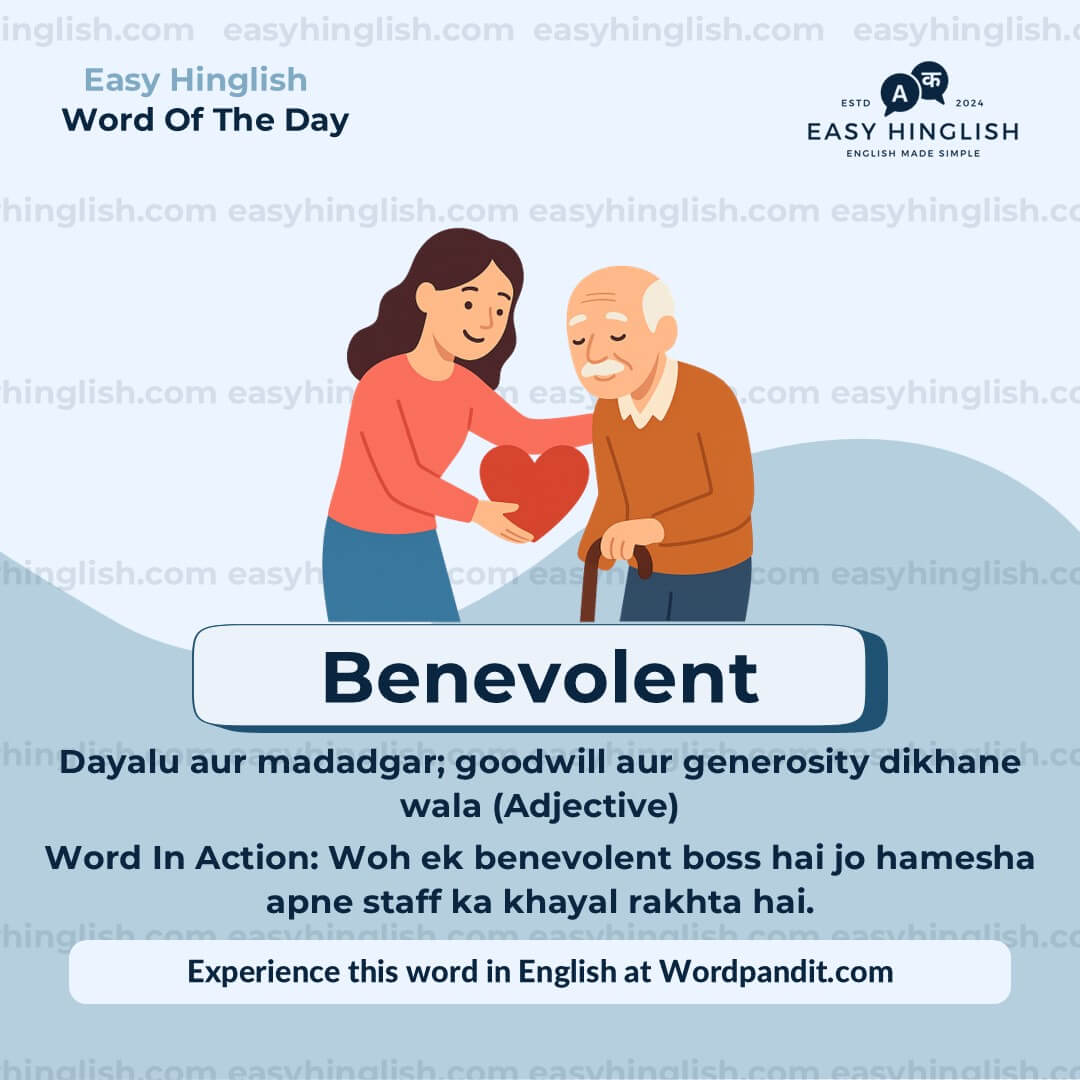Daily Vocabulary International Newspapers aur Publications se Seekho
Wordpandit ke Global Vocabulary Hub ke Saath Apni Vocabulary Expand Karo
Wordpandit par, hum aapko ek truly global vocabulary develop karne me madad karte hain, jo duniya ke sabse respected international publications se li gayi hoti hai. Yeh section aapko naye words se introduce karne ke liye design kiya gaya hai jo global conversations aur trends ko define karte hain.
Global Sources ka Power
Aapko globally sochne aur communicate karne me madad dene ke liye, hum vocabulary curate karte hain world ke top international sources se, jaise:
- The New York Times
- The Washington Post
- BBC
- The Guardian
- The Economist
- Scientific American
- Psychology Today
- Aur bhi bahut saare...
Globally Socho, Competitively Seekho
Hamare daily updates se aap international publications ke naye words seekhoge jo global news aur developments se jude hote hain. Isse aapki vocabulary current bhi rahegi aur globally relevant bhi.
Apni Global Soch Ko Expand Karo
Agar aap international exams ki tayari kar rahe ho, global business communication me excel karna chahte ho, ya sirf apni language skills improve karna chahte ho, toh Wordpandit aapko global level pe grow karne ke liye best resources provide karta hai.
Smart Learning, Global Reach
Hamari learning methodology me global examples, memory aids, aur interactive activities shamil hain, jo naye words ko effectively yaad karne aur real-world me use karne me madad karti hain.
Aaj Hi Apni Global Vocabulary Journey Shuru Karo!
Wordpandit Kyun Choose Karein?
Practical Learning: Aise words seekho jo real-world reading aur communication me aapko sach me kaam aayenge, taaki aapki comprehension aur bolne ki skills improve ho.
Diverse Content: Current affairs se lekar scientific breakthroughs tak, hamare different sources aapko multiple domains ki vocabulary seekhne ka moka dete hain.
Effortless Integration: Wordpandit ko apni daily routine ka part banao. Sirf kuch minute har din dene se aapki vocabulary time ke saath kaafi improve ho sakti hai.
Vocabulary Mastery Tak Ka Aapka Safar
- Regularly hamare Daily Vocabulary section ko visit karo
- Naye words explore karo aur unka context me use samjho
- In words ko apni writing aur bolne ki practice me use karne ki koshish karo
- Jaise-jaise aapke words badhte hain, apni progress ko track karo
Aaj Hi Apni Vocabulary Journey Shuru Karo!
Wordpandit ke saath vocabulary improve karna start karo. Roz thoda effort dalne se aap ek strong vocabulary develop kar sakte ho jo academic, professional, aur personal life me kaafi kaam aayegi.
Yaad rakho, ek naya shabd roz seekhna linguistic limitations ko door karne ka best tareeka hai! Wordpandit ko apni daily learning journey ka sathi banao aur vocabulary excellence ki taraf badho!
WORD-1: Bewildering
Context:
"Dealing with complicated directions or difficult math problems can be a bewildering context for students." - Aeon
Explanatory Paragraph:
The word "bewildering" refers to something that causes confusion or makes someone feel lost or unsure. When you face a situation that is full of unfamiliar details, conflicting information, or unexpected challenges, it can leave you feeling mentally disoriented — that's when something is said to be bewildering.
Meaning: Extremely confusing or puzzling (Adjective)
Pronunciation: buh-WIL-duhr-ing
Difficulty Level: ⭐⭐⭐ Intermediate
Etymology: From the prefix "be-" (thoroughly) + "wilder" (to lead astray, confuse), originally derived from Middle English "wilder" (to lead astray)
Prashant Sir's Notes:
When preparing for exams or reading dense material, students often encounter bewildering content. This word is especially useful when describing overwhelming experiences that need clarification or support to understand.
Synonyms & Antonyms:
Synonyms: confusing, perplexing, baffling, puzzling, mystifying
Antonyms: clear, understandable, straightforward, simple
Usage Examples:
- The instructions for assembling the furniture were utterly bewildering.
- She found the rapid changes in policy bewildering and hard to follow.
- The plot of the movie was so bewildering that many viewers left the theater puzzled.
- Walking through the maze without a map was a truly bewildering experience.
Cultural Reference:
"The bewildering pace of technological change can leave even experts feeling behind." - Paraphrased from a TED Talk on Digital Literacy
Think About It:
Have you ever faced a situation so bewildering that it forced you to question your usual way of thinking? What did you learn from that experience?
Quick Activity:
Think of a time when you felt confused by a task or subject. Write two sentences using the word "bewildering" to describe that moment.
Memory Tip:
Think of "wild" in "bewildering" — when things feel wild or out of control, your mind feels lost and confused, just like the meaning of the word!
Real-World Application:
Use "bewildering" to describe experiences like navigating a new city without a map, trying to understand complex tax documents, or dealing with unexpected life events. It helps convey how mentally disorienting something can be.
WORD-2: Contraception
Context:
"Clarence Thomas has suggested overturning the marriage equality decision and even the right to contraception." - New York Times
Explanatory Paragraph:
"Contraception" refers to the methods or devices used to prevent pregnancy. It includes options such as birth control pills, condoms, intrauterine devices (IUDs), and more. Contraception allows individuals to plan if and when they want to have children, giving them control over their reproductive health and family planning choices.
Meaning: The deliberate use of artificial methods or other techniques to prevent pregnancy as a consequence of sexual intercourse (Noun)
Pronunciation: kon-truh-SEP-shun
Difficulty Level: ⭐⭐⭐ Intermediate
Etymology: From Latin "contra" (against) + "conception" (the act of conceiving); first used in the early 20th century
Prashant Sir's Notes:
This word often appears in social, legal, and health-related contexts. Understanding "contraception" is essential for anyone engaging with issues around gender rights, healthcare policy, or reproductive education. It’s not just a biological term but also carries significant cultural and political weight.
Synonyms & Antonyms:
Synonyms: birth control, family planning, fertility control
Antonyms: conception, fertilization, pregnancy
Usage Examples:
- Many couples use contraception to plan their families responsibly.
- Access to contraception has been a critical part of public health initiatives.
- Debates over contraception often involve political, religious, and ethical viewpoints.
- The new health policy guarantees free contraception for all citizens.
Cultural Reference:
"The birth control pill revolutionized women's freedom and autonomy in the 1960s." - Referenced in PBS's *American Experience* documentary
Think About It:
Should access to contraception be considered a fundamental human right? Why or why not?
Quick Activity:
Match the method with its type: (a) Condom — Barrier, (b) IUD — Device, (c) Pill — Hormonal. Now write one sentence using "contraception" correctly.
Memory Tip:
Break it into “contra” (against) + “ception” (conception): Contraception = against conception or preventing pregnancy.
Real-World Application:
Understanding contraception is crucial in areas like sex education, public health, gender policy, and healthcare access. It's often discussed in legal rulings, global development goals, and personal health decisions.
WORD-3: Arduous
Context:
"A series of steps or actions that demands a lot of effort over time, like 'the arduous process to secure a new role.'" - New York Times
Explanatory Paragraph:
The word "arduous" refers to something that requires significant effort, energy, or endurance to complete. It’s commonly used to describe tasks, journeys, or responsibilities that are long, tough, and mentally or physically taxing. When something is described as arduous, it is not only difficult but also demanding over a prolonged period.
Meaning: Involving or requiring strenuous effort; very difficult and tiring (Adjective)
Pronunciation: ar-joo-uhs
Difficulty Level: ⭐⭐⭐ Intermediate
Etymology: From Latin "arduus" meaning 'steep, difficult'
Prashant Sir's Notes:
Think of "arduous" as the opposite of easy. It often refers to long, challenging processes like job applications, exam preparation, or physical training. When students prepare for competitive exams, it's an arduous journey—but one that pays off in the end.
Synonyms & Antonyms:
Synonyms: difficult, strenuous, laborious, grueling, taxing
Antonyms: easy, effortless, simple, light
Usage Examples:
- Training for a marathon is an arduous task that requires months of dedication.
- The team endured an arduous journey through the jungle to reach the village.
- Completing the thesis was an arduous but fulfilling process.
- She went through an arduous recovery after her surgery.
Cultural Reference:
"Climbing Mount Everest remains one of the most arduous physical challenges on Earth." - National Geographic
Think About It:
What is one arduous task you’ve completed in your life, and what did it teach you about persistence?
Quick Activity:
List 3 activities in your daily life that you consider arduous. Now write one sentence using the word "arduous" for each.
Memory Tip:
Think of "ARDUOUS" as "HARD-U-OUS" — if something is HARD for YOU, it’s ARDUOUS!
Real-World Application:
Use "arduous" when describing a long and challenging process in emails, reports, or conversations—like "an arduous negotiation" or "an arduous approval process."
WORD-4: Ambivalent
Context:
"A lot of them are in that rather ambivalent, mushy middle of the country when it comes to abortion politics." - New York Times
Explanatory Paragraph:
When someone is ambivalent, they have mixed or contradictory feelings about something. It means being unsure or torn between two opposing choices or viewpoints. Rather than having a clear opinion, ambivalent people often feel pulled in different directions emotionally or intellectually, which can lead to indecision or confusion. In the political context, it describes individuals who don't strongly lean to one side or the other.
Meaning: Having mixed feelings or contradictory ideas about something or someone (Adjective)
Pronunciation: am-biv-uh-luhnt
Difficulty Level: ⭐⭐⭐ Intermediate
Etymology: From Latin "ambi-" meaning "both" + "valentia" meaning "strength or power" — suggesting opposing forces
Prashant Sir's Notes:
Use "ambivalent" when you want to express that you (or someone else) feel both positive and negative emotions at the same time. It's not about not caring — it's about caring in conflicting ways. For example, feeling ambivalent about moving to a new city: excited for new experiences but sad to leave behind friends.
Synonyms & Antonyms:
Synonyms: conflicted, uncertain, torn, undecided, hesitant
Antonyms: decisive, certain, resolute, clear, determined
Usage Examples:
- She felt ambivalent about accepting the promotion because it meant relocating away from her family.
- Many voters remain ambivalent about the upcoming election, unsure of which candidate to support.
- He had an ambivalent attitude toward fame—craving attention yet fearing the loss of privacy.
- Her ambivalent feelings toward the breakup made it hard for her to move on.
Cultural Reference:
"Ambivalence is the hallmark of modern relationships—wanting both freedom and connection." - From Esther Perel, renowned psychotherapist
Think About It:
Can being ambivalent ever be an advantage in decision-making? When is it better to embrace ambiguity rather than rush to judgment?
Quick Activity:
Write about a time when you felt ambivalent about a big decision. Use the word "ambivalent" in your reflection at least twice.
Memory Tip:
Break it down: "ambi" (both) + "valent" (feelings) = feeling both ways — that’s ambivalent!
Real-World Application:
Use "ambivalent" to describe public opinion, personal dilemmas, or even customer reviews — anywhere people have mixed feelings, such as “ambivalent consumer reactions” or “an ambivalent response to the new policy.”
WORD-5: Benevolent
Context:
"A benevolent ruler is one who governs fairly and with compassion." - Aeon
Explanatory Paragraph:
"Benevolent" describes someone who is kind, generous, and genuinely wishes to help others. A benevolent person or leader acts with good intentions and shows concern for the well-being of others. The word is often used to describe rulers, organizations, or individuals who use their power or resources to do good rather than act selfishly or harshly.
Meaning: Kind and well-meaning; showing goodwill and generosity (Adjective)
Pronunciation: buh-nev-uh-luhnt
Difficulty Level: ⭐⭐ Beginner to Intermediate
Etymology: From Latin "bene" meaning "well" + "volens" meaning "wishing" — literally, "well-wishing"
Prashant Sir's Notes:
Think of a benevolent leader as the opposite of a tyrant. Benevolence comes from “bene” meaning good. Whenever you see a person in power using their influence kindly or selflessly, "benevolent" is the perfect word. It's also commonly used when describing charities or acts of kindness.
Synonyms & Antonyms:
Synonyms: kind-hearted, generous, compassionate, altruistic, philanthropic
Antonyms: cruel, malevolent, selfish, harsh, unkind
Usage Examples:
- The benevolent teacher always stayed after class to help struggling students.
- She made a benevolent donation to the orphanage without seeking recognition.
- The company is known for its benevolent policies toward employees and the environment.
- Despite his wealth, he remained humble and benevolent toward the less fortunate.
Cultural Reference:
"Mahatma Gandhi is often remembered as a benevolent leader who led with peace and compassion." - History Texts
Think About It:
Can true benevolence exist without any expectation of return or recognition?
Quick Activity:
List 2 people in your life you would describe as benevolent. Then, write one sentence for each explaining why.
Memory Tip:
“Benevolent” starts with “bene” — just like “benefit” — both relate to something good or helpful!
Real-World Application:
Use "benevolent" to describe leaders, managers, mentors, or even policies that are guided by kindness and generosity — e.g., “a benevolent leadership style” or “benevolent workplace culture.”













